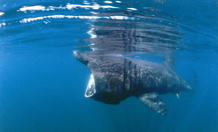
Basking shark feeding. Image copyright SNH - Paul Naylor.
University scientists to reveal the secret life of sharks
University of Exeter scientists are part of a team investigating the movements of large sharks visiting Scottish waters.
The ambitious project begins in Hebridean seas off the West coast of Scotland on 13 July.
Marine biologists from the University of Exeter and Scottish Natural Heritage (SNH) will attach satellite tracking tags to 20 basking sharks in the seas around the Inner Hebrides, off the west coast of Scotland. Once fitted, the tags will allow people to track the movements of the sharks on the SNH website in close-to-real time.
The tags will provide information on the location and behaviour of the sharks during the summer when they can be seen feeding in large numbers at the surface. They will also track the sharks for several months afterwards, helping scientists understand if the sharks travel to deeper water around Scotland and further afield over the winter.
The tagging work will take place in the waters around Coll and Tiree, and the small island of Hyskeir, near Canna. Research has shown these areas are hotspots for basking sharks, with consistently large numbers sighted there during the summer months. Even though basking sharks are seen in many places round Scotland, displays of social and courtship behaviour, such as breaching and following each other nose-to-tail, have only been observed in these areas, suggesting they are important for key stages in the life cycle of the sharks.
Dr Matthew Witt of the University of Exeter’s Environment and Sustainability Institute at the Cornwall Campus said: “Although they have captured the public imagination, we actually know relatively little about how basking sharks live. This is a fantastic opportunity for us to find out more about the movements and lifestyles of these fascinating creatures.
“This project will use some of the newest animal tracking technology available for marine species that allows us to know where the sharks are with near GPS accuracy. This is a hugely challenging project – not least because we are at the mercy of the weather and sea conditions – but the results will prove invaluable in our quest to uncover the secrets of these giants of the sea and help to protect them.”
Professor Brendan Godley of the University of Exeter’s Centre for Ecology and Conservation at the Cornwall Campus said: “The University of Exeter has played a leading role in the international effort to gain insights into the migrations of marine animals, using satellite tracking. This work on sea turtles, manta rays and now basking sharks is greatly informing conservation.
“This latest project is a great example of how we are working with agencies all over the world to discover more about the amazing marine life that inhabits our oceans. In particular, it complements our ongoing research related to the potential positive and negative effects of marine renewable energy on biodiversity.”
Dr Suz Henderson from SNH, who is managing the basking shark tagging project said: “We’re really lucky to have the world’s second largest fish visit our waters every summer but we know very little about their movements throughout the rest of the year. We want to know how the sharks use the waters between Skye and Mull and how long they remain in the area. We’d also like to find out how important this area is in the life cycle of the sharks, and if some areas are used more than others. The results from this project will help to answer these questions.
“In addition an area between Skye and Mull has recently been identified as a place where it might be appropriate to develop a marine protected area (MPA) to protect basking sharks. The tagging work will help determine if an MPA is an appropriate way to safeguard these magnificent animals.”
The tags, which are attached to the sharks using titanium darts and darting poles, will record information on the movement of the sharks, including depth and water temperature. The tags will detach from the sharks after several months.
“The tags might be washed up on beaches after being released from the sharks and if we are able to retrieve them they will provide us with additional information” added Suz. “We’ll be asking the public to keep an eye open for them and help us recover as many as we can.”
The area where the study is being undertaken overlaps with an offshore wind farm proposal west of Tiree, known as the Argyll Array. The tagging project will provide information about the use of this area by the sharks, giving additional confidence to the advice which SNH provides to Marine Scotland as the development goes through the licensing process.
To track the basking sharks online, after they are tagged, go here.
Date: 13 July 2012

